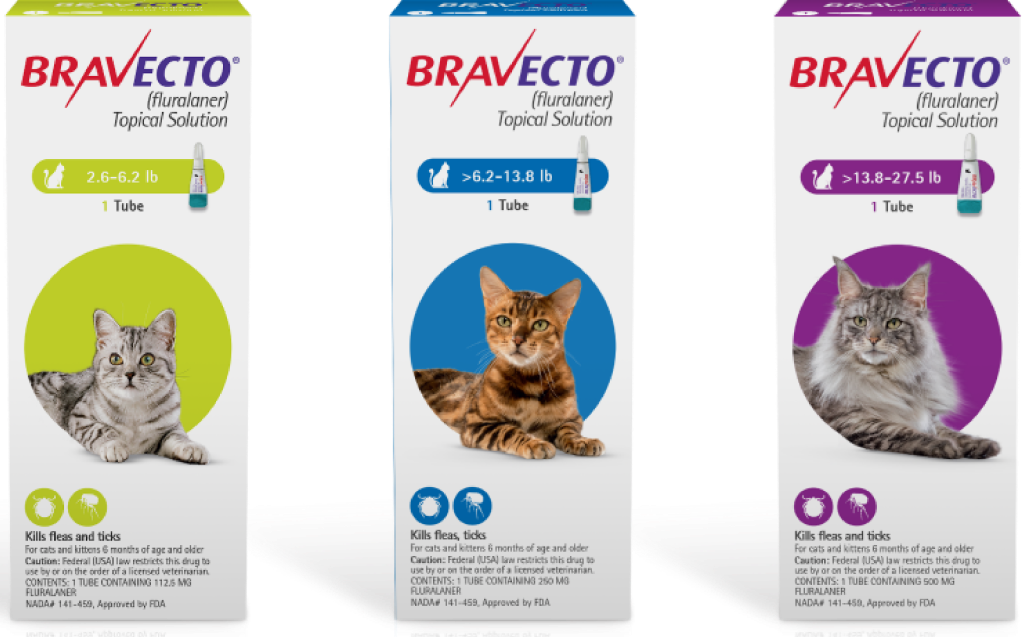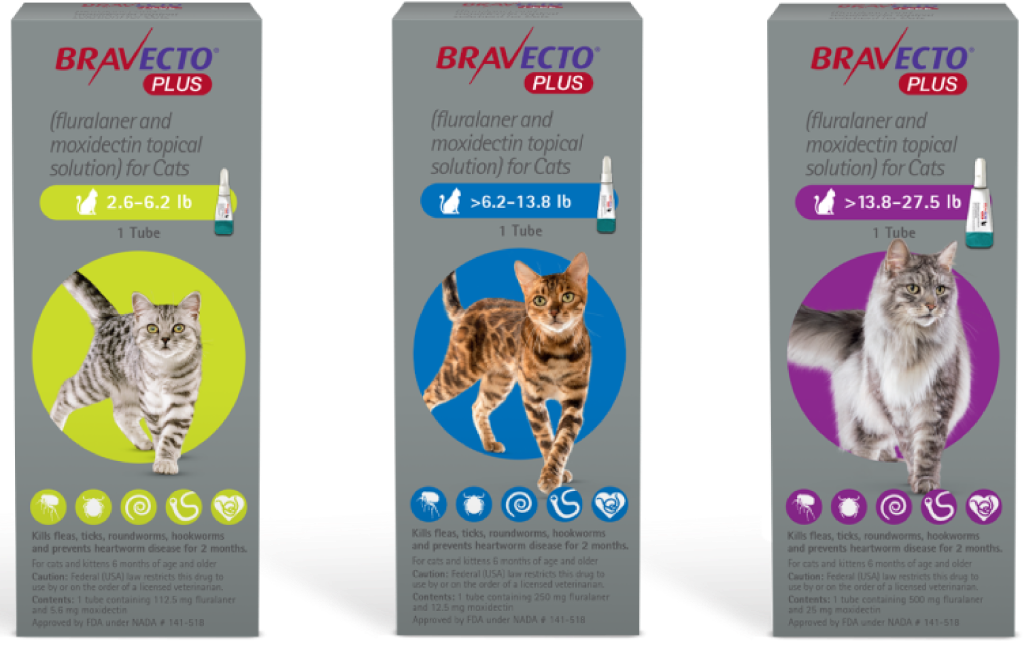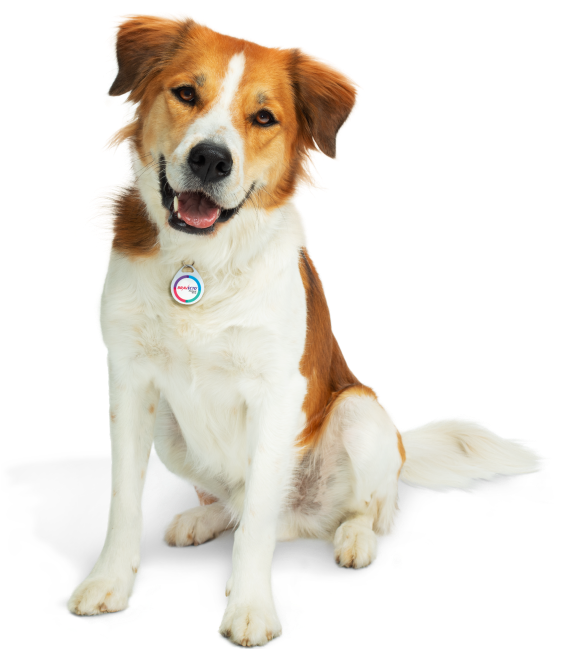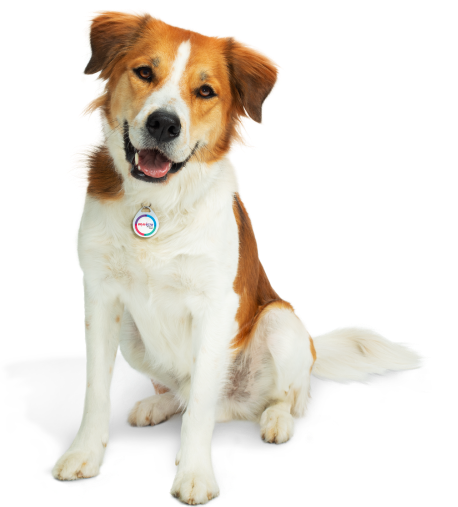
Cats
PROVEN PROTECTION

Cats
PROVEN
PROTECTION
Your cats deserve the best in long-lasting protection
Your cats deserve the best in long-lasting protection
Which BRAVECTO product is right for you and your feline friend?
Which BRAVECTO product is right for you and your feline friend?

BRAVECTO (fluralaner topical solution) for Cats
BRAVECTO and its easy Twist’n’Use™ applicator allow you to conveniently protect your cats for 12 weeks.*1


BRAVECTO Plus (fluralaner and moxidectin topical solution) for Cats
BRAVECTO Plus offers protection against fleas and ticks, as well as additional protection against heartworms for 2 months, and also treats roundworms and hookworms.2


Find out where you can get your paws on BRAVECTO today!

BRAVECTO is available by prescription only.

Find out where you can get your paws on BRAVECTO today!
BRAVECTO is available by
prescription only.

*BRAVECTO kills fleas, prevents flea infestations. BRAVECTO (fluralaner) Chews for Dogs kills ticks (black-legged tick, American dog tick, brown dog tick, and Asian longhorned tick) for 12 weeks. BRAVECTO Chews also kills lone star ticks for 8 weeks. BRAVECTO (fluralaner topical solution) for Dogs kills ticks (black-legged tick, American dog tick, and brown dog tick) for 12 weeks. BRAVECTO Topical Solution for Dogs also kills lone star ticks for 8 weeks. BRAVECTO (fluralaner topical solution) for Cats kills ticks (black-legged tick and Asian longhorned tick) for 12 weeks. BRAVECTO Topical Solution for Cats also kills American dog ticks for 8 weeks.
References
1. BRAVECTO Topical Solution for Cats [prescribing information]. Rahway, NJ: Merck Animal Health; 2016. 2. BRAVECTO PLUS (fluralaner and moxidectin topical solution) for Cats [prescribing information]. Rahway, NJ: Merck Animal Health; 2019.
Important Safety Information
Important Safety Information
BRAVECTO 1-MONTH (fluralaner) Chews: indicated for dogs 8 weeks of age and older. The most commonly reported adverse reactions include itching, diarrhea, vomiting, decreased appetite, elevated ALT, lethargy, and weight loss. BRAVECTO 1-MONTH is not effective against A. americanum in puppies less than 6 months of age. BRAVECTO (fluralaner) Chews for Dogs: The most commonly reported adverse reactions include vomiting, lethargy, diarrhea, anorexia and pruritus. In some cases, adverse events have been reported following use in breeding females. BRAVECTO (fluralaner topical solution) for Dogs: The most commonly reported adverse reactions include vomiting, hair loss, diarrhea, lethargy, decreased appetite, and moist dermatitis/rash. BRAVECTO (fluralaner topical solution) for Cats: The most commonly reported adverse reactions include vomiting, itching, diarrhea, hair loss, decreased appetite, lethargy, and scabs/ulcerated lesions. BRAVECTO Topical Solution for Cats is not effective against American dog ticks beyond 8 weeks of dosing. BRAVECTO PLUS (fluralaner and moxidectin topical solution) for Cats: The most commonly reported adverse reactions include vomiting, hair loss, itching, diarrhea, lethargy, dry skin, elevated ALT, and hypersalivation. BRAVECTO PLUS has not been shown to be effective for 2 months in kittens less than 6 months of age. Use with caution in cats that are heartworm positive. The effectiveness of BRAVECTO PLUS to prevent heartworm disease after bathing or water immersion has not been evaluated.
BRAVECTO has not been shown to be effective for 12-weeks’ duration in puppies or kittens less than 6 months of age. BRAVECTO Chews and Topical Solution for dogs is not effective against the lone star tick beyond 8 weeks of dosing. BRAVECTO Topical Solution for Dogs and Cats and BRAVECTO PLUS for cats are for topical use only. Avoid oral ingestion. The safety of BRAVECTO Topical Solution for Cats and BRAVECTO PLUS has not been established in breeding, pregnant, and lactating cats.
All BRAVECTO products contain fluralaner, which is a member of the isoxazoline class. This class has been associated with neurologic adverse reactions including tremors, ataxia, and seizures. Seizures have been reported in dogs receiving isoxazoline class drugs, even in dogs without a history of seizures. Use with caution in dogs with a history of seizures or neurologic disorders. Neurologic adverse reactions have been reported in cats receiving isoxazoline class drugs, even in cats without a history of neurologic disorders. Use with caution in cats with a history of neurologic disorders.




